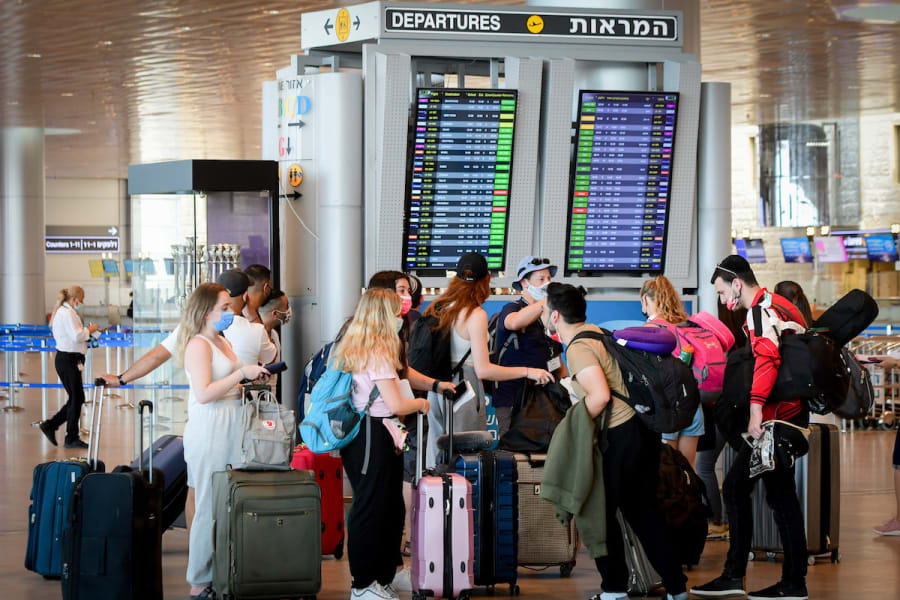With Israel officially out of its fourth COVID wave, will tourists be allowed to visit?
Though nothing is finalized, vaccinated individual tourists may be allowed back next month

Israel is officially on its way out of the fourth COVID wave since the pandemic began in March 2020 – and this could be good news for tourists as well.
With a 35% drop in the number of patients in serious condition over the past two weeks – without a lockdown over the holidays or a distruption the school system – officials are slightly more optimistic, if not relaxed.
“We continue to see the drop in the statistics, yesterday as well,” Health Ministry Director-General Nachman Ash said in an interview with 103FM radio on Tuesday. “We can say with certainty that we are on our way out of this wave. We'll be able to be a bit more calm.”
At some point this summer, the story was vastly different. In fact, panic had set in. Mandates governing entry to places of work and leisure were tightened and quarantines were required for anyone returning from overseas.
Around that time, Israel had the world’s highest number of COVID cases per 1 million people during a seven-day period, according to a study published Sept. 30, in the peer-reviewed European Journal of Epidemiology Vaccines.
And this with more than 60% of its population fully vaccinated at the time.
The surge prompted Israel to pioneer a booster shot of Pfizer’s COVID-19 vaccine for every Israeli from 12 years old – the first country to do so and well before the FDA approved its use for people 65 and over only.
Since late July, nearly 3.8 million Israelis have received a third shot – more than two thirds of the country – which has likely contributed to a drastic downturn in the infection rate over the past two months.
“We have done the maximum with regards to vaccines as well, and with bringing in the rapid tests,” Ash said.
As of Wednesday, only 412 patients were hospitalized in serious condition compared to nearly 700 just over two weeks ago. The number of people who have died from COVID is 7,959.
GREEN PASSPORTS REQUIRED
The booster campaign, however, served to redefine who is considered vaccinated. Green Passports, proof of vaccination, for anyone more than six months from their two initial shots or recovery from COVID have expired. Only those with a booster shot are considered fully vaccinated now.
This standard applies to foreigners who wish to come to Israel. “Vaccinated” means less than six months from their latest vaccine, whether the initial two shots or the booster.
Israel is supposed to be launching a new pilot program to allow individual tourists into the country starting next month. While there are conflicting reports on which countries this applies to, at the very least all incoming visitors must be fully vaccinated and take a PCR test within 72 hours of departure and again upon arrival in Israel.
Currently the only tourists permitted entry into Israel are groups.
Tourists must have digital, electronic vaccine passports to get into and around Israel. Israelis must have proof of vaccination – the Green Passport – in order to access venues such as restaurants and hotels. The same would be required of tourists.
According to the report in Globes, "In the first stage, only tourists from some 40 countries, mainly EU countries, which have mutual vaccination agreements with Israel, will be allowed to enter Israel.”
The U.S. would be part of the second stage if the pilot is successful – and even then may be limited to residents of New York and California. In both of these states, cities require vaccine ID to enter certain venues.
Yet another consideration, according to the Globes report, is to allow all vaccinated tourists to enter Israel from Nov. 21, except for those from countries that require a visa to visit Israel.
But Sharon Alroy-Preis, head of Public Health Services at the Health Ministry, said at the Jerusalem Post Conference on Tuesday that starting from November, vaccinated tourists from America will be allowed into Israel, and exempt from quarantine, with their own health declaration and their electronic vaccine passport that can be used in Israel.
“They are going to get in with their own declaration of vaccination,” she said. “Once they get in, they have to submit their vaccination status and their certificates. A percentage of them will be inspected.”
Alroy-Preis, who has been one of the hard-line decision makers in the Ministry of Health during in this pandemic, said the safest bet is to keep the skies closed, which Israel had done for months. But at least, she said, testing will remain in place.
“We know that the borders are the place from which the next variant probably will come, so we need to control them better,” she said “Therefore, we cannot really afford losing the PCR before boarding a plane and after landing. At some point, we may need to ask for another PCR test three or four days after arrival.”
A final plan has yet to be approved.

Nicole Jansezian was the news editor and senior correspondent for ALL ISRAEL NEWS.














